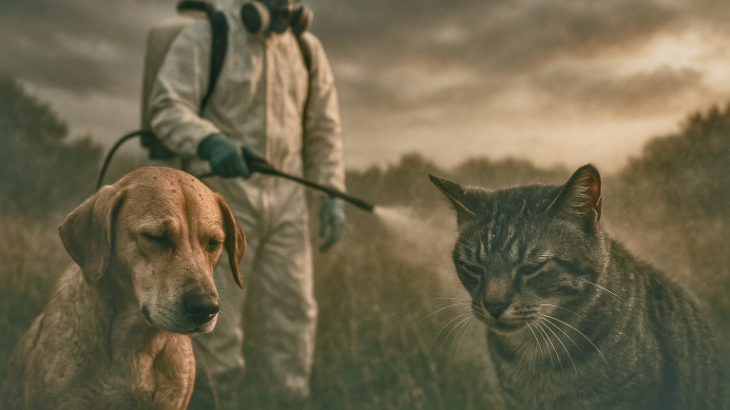Pesticides and your pet

This article was originally produced as a leaflet by Leicester Friends of the Earth, who have kindly allowed CA-WN to reproduce it.
Do you own a pet?
Do you use tick, flea, lice and worm treatments?
Are you worried about your pet getting poisoned?
If so, please read on.
Tick, flea, lice and worm treatments
The majority of pet pest treatments rely on five chemicals:
- Dinoteguran
- Fipronil #
- Imidacloprid
- Nitenpyram
- Permethrin #
All are highly toxic to bees, banned or never approved for use in agriculture and those marked with a # are carcinogens and hormone disruptors. Despite all that they are turning up in our rivers from pet urine and from their fur when swimming. If pets are combed and the fur left out for nesting birds, it can have an adverse effect on nesting success rates. Vets often encourage pet owners to treat their pet with pest reduction products all year round, making the problem worse.
What can you do?
- Check the product you are using and try to avoid products containing the chemicals above – ask your vet for an alternative
- Don’t leave pet hair out for birds when you have combed your pet
- Avoid tick and flea treatments if you think exposure is low e.g., winter
Pet poisoning
Incidences of pet poisoning from pesticides, as recorded by the Veterinary Poisons Information Service (VPIS) are increasing. As this relies on voluntary action by vets it is likely to be a large underestimate.
What’s going on?
When out walking your dog, or when your cat is out roaming, contact with pesticides is hard to avoid, as they are used in agriculture, urban areas and even gardens. Symptoms include vomiting, diarrhoea, drooling, irritation to the skin or eyes, chemical burns, breathing problems, lethargy, disorientation, seizures and even death.
What can you do?
- If you see somebody out spraying, avoid the area and try and get upwind, as spray drift is a big issue – you don’t want to be breathing it in. Bear in mind there are normally no signs to warn people that spraying is, or has been, happening
- If you see discoloured patches of grass/plants, keep your dog away from the area and do not let them lie on it, eat grass from that area or drink from puddles nearby
- Don’t use pesticides at home
- If your pet shows signs of the symptoms above and you think pesticides may be the cause, see your vet and ensure you tell them that you suspect poisoning may be the cause and you want it registering with the VPIS – we need more evidence.
If you aren’t happy with your local council spraying where you walk your dog, please let them know - https://www.writetothem.com/
